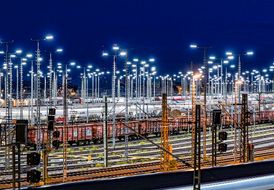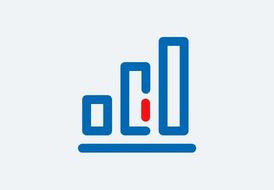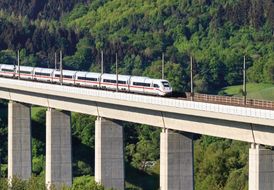National environment
DB Group
Coalition agreement of the new Federal Government
In their coalition agreement of November 24, 2021, the Social Democratic Party of Germany (Sozialdemokratische Partei Deutschland; SPD), Alliance 90/the Greens (Bündnis 90/Die Grünen) and the Free Democratic Party (Freie Demokratische Partei; FDP) declared their commitment to an efficient rail system and to the integrated DB Group:
- By 2030, the new Federal Government aims to increase the market share of rail freight transport to 25% and to double the rail passenger transport volume sold.
- Rail is to receive significantly more capital expenditures than roads.
- Within DB Group, the infrastructure units DB Netz AG and DB Station&Service AG are to be “merged into a new infrastructure division focused on public welfare.”
- The financing opportunities of the infrastructure area of DB Group are to be strengthened and improved.
- Other key projects for the sector include the rapid implementation of the Master Plan for Rail Transport and of Germany in sync, a “rapid capacity expansion” program, the consolidation and strengthening of the station programs, the digitalization of vehicles and lines, the accelerated introduction of digital automatic coupling, the strengthening of single wagon transport and combined transport, an increase in regionalization funds and an expansion and modernization package for local public transport.
- To speed up implementation, the coalition wants to set up a rail acceleration commission.
Economic Stimulus Package of the Federal Government
In June 2020, the Federal Government agreed on comprehensive measures in relation to the topic of “Tackling the Covid-19 Impact, Securing Prosperity, Strengthening Readiness for the Future.” These included a number of general relief measures for the German economy, while simultaneously providing industry-specific stimuli in 2020 and 2021. Progress was made in this area in 2021, particularly with regard to the compensation measures for DB Group related to Covid-19:
- In the 2020 supplementary budget, the strengthening of DB AG’s equity by € 5 billion for the partial compensation of losses was intended.
- This sum was carried over to 2021 in the 2021 Federal budget because the coordination with the European Commission (EU Commission) with respect to state aid law had not yet been completed in 2020.
- Based on the progress made in the negotiations with the EU Commission, the 2021 supplementary budget adopted by the German Parliament in April 2021 reduced the funds that had been intended for the equity increase by just under € 3.1 billion and reallocated that amount:
- The Federal funds intended for the maintenance of tracks of the Federal railways were increased by € 650 million to compensate for the omission of DB AG’s dividend payment for the 2020 financial year.
- The expenditure to subsidize train-path prices in rail freight transport was increased by€ 600 million, and a further€ 27 million was allocated to a commitment appropriation for 2022 to pay for services provided in December 2021. To subsidize train-path prices in long-distance rail passenger transport, about€ 1.8 billion was also included in the Federal budget, plus a commitment appropriation for 2022 totaling€ 279 million to pay for services provided in December 2021 and to continue subsidizing train-path prices in long-distance rail passenger transport until May 2022.
The coordination regarding state aid law with the EU Commission on subsidizing train-path prices in long-distance rail passenger transport and rail freight transport was adopted in 2021 with retroactive effect from March 2020, as was the compensation for losses in long-distance rail passenger transport for the first shutdown in spring 2020. The corresponding measures were implemented in 2021. The coordination regarding state aid law on compensation for losses in rail freight transport was also completed. The coordination with the EU Commission regarding additional compensation for losses is still ongoing.
The Act on Accompanying Measures for the Implementation of the Economic Stimulus and Crisis Management Package (Gesetz über begleitende Maßnahmen zur Umsetzung des Konjunktur- und Krisenbewältigungspakets) provided for an additional one-time increase of€ 2.5 billion in regionalization funds in 2020, with which the Federal Government contributed half of the industry solution for local public transport. For 2021, the Federal Government has also promised to contribute€ 1 billion (half of the total amount) to the continuation of the industry solution, provided that the Federal states contribute the same amount as in 2020. The industry solution for local public transport is also set to continue in 2022.
Further information on the economic stimulus package of the Federal Government (2020 Integrated Report).
Implementation of the Climate Action Program 2030
On the basis of the Federal Government’s Climate Action Program 2030, additional Federal funds totaling€ 11 billion will be made available by 2030 to strengthen the rail system. At the end of January 2020, the Federal Ministry of Finance (Bundesministerium für Finanzen; BMF) and the Federal Ministry for Digital and Transport (Bundesministerium für Digitales und Verkehr; BMDV), and DBAG, DB Netz AG, DB Station&Service AG and DB Energie GmbH, agreed on the inflow and use of the funds in a joint letter of intent. The funds will be used exclusively for infrastructure; half will be paid as equity and half as grants to DB Netz AG and DB Station&Service AG. In terms of content, the funds will be used in the categories of a robust network, digital rail, attractive railway stations and economically self-reliant infrastructure measures. Following the completion of coordination with the EU Commission, the equity increases set out in the 2021 Federal budget for 2020 and 2021, totaling€ 2.125 billion, were implemented in November 2021. For 2022 to 2024, further equity measures of€ 1.125 billion per year are scheduled as part of the Climate Action Program 2030 and will also be used entirely for infrastructure.
Amendment to the German Federal Climate Change Act and immediate climate-protection action program
On April 28, 2021, the Federal Constitutional Court published a resolution on the Climate Change Act confirming the legitimacy of the admissibility of the fixing of targets for reducing greenhouse gas and emissions limits. At the same time, it calls for the targets to be made more ambitious and the requirements for the period after 2030 to be made more specific. In compliance with this requirement, the legislator has passed an amendment to the law. The targets for national greenhouse gas reduction for 2030 will be increased from –55% to –65%. At –88% a specific target for 2040 was set for the first time. Germany’s target year for climate neutrality is being brought forward from 2050 to 2045. For the transport sector, the annual maximum amount of greenhouse gas emissions will be reduced from its previous level of 95 million to 85 million tons of CO₂ equivalents in 2030. Emissions in the transport sector must therefore fall by at least 48% (previously: 42%).
In addition to amending the Climate Change Act, the Federal Government also adopted an immediate action program in June 2021 amounting to€ 8 billion by 2025. The main focus is on 2022 and 2023. For the rail system, a total of€ 200 million has been earmarked for additional digitalization projects. These funds are subject to the final approval of the 2022 Federal budget, which is expected to take place at the end of the second quarter of 2022.
National Platform for the Future of Mobility
In the Federal Government’s National Platform for the Future of Mobility (NPM), DB Group is represented in the steering committee, as well as in the working groups for climate protection in transport and digitalization for the mobility sector. In June 2021, the working group for climate protection in transport presented a report on how the measures already taken under the Climate Protection Program 2030 can be further accelerated and expanded in order to meet the requirements for climate protection in transport. Measures to strengthen and further electrify the rail system and public transport will play a leading role. In the framework of other working groups, in-depth elaborations were prepared on electromobility and digitalization in transport, for example. In this context, DB Group is part of the RealLab Hamburg project which investigates the challenges and needs of intermodal and autonomous mobility. In October 2021, the NPM submitted a report of its results for 2018 to 2021. The work of the NPM has therefore ended for the time being.
Master Plan for Rail Transport and Germany in sync
As a result of the work of the Rail Future Alliance, the BMDV published the Master Plan for Rail Transport in June 2020, which is broadly supported by the industry. The implementation of the plan as a whole and of key elements such as Germany in sync is being handled by bodies that continue to operate under the direction of the Federal Government with the involvement of DB Group.
The Federal Government’s annual rail summits will publicly discuss the current status and remaining challenges. On May 17, 2021, the third rail summit focusing on European transport took place. Several EU member states signed a letter of intent to create TransEuropExpress (TEE) 2.0 for cross-border, high-speed and night rail traffic. This is expected to become part of a networked and synchronized European schedule.
On August 18, 2021, the BMDV announced its positive economic assessment of a range of measures for Germany in sync. Some 180 measures have become urgent priorities in the rail requirement plan. This is linked to a basic ability to finance the measures under the requirement plan. The assessment is based on the target schedule 2030+ drafted by independent Federal Government experts, the final report for which was submitted in September 2021.
Railway regulation law
The amendment to the Railway Regulation Act (Eisenbahnregulierungsgesetz; ERegG) which entered into force on June 18, 2021, adapted the national legal framework to developments in EU law and provides the basis for new models for capacity allocation and schedule preparation, including for Germany in sync. These models will be developed further in a national legislative decree on the conducting of pilot projects.
Infrastructure
Railway Law Reform Act
The Railway Law Reform Act (Eisenbahnrechtsbereinigungsgesetz; EbRbG) entered into force on July 1, 2021. 1. In addition to more editorial adjustments in various laws, the EbRbG fundamentally reorganized the laws relating to sidings in the General Railway Act (Allgemeinen Eisenbahngesetz; AEG), and creation of new regulations on vegetation control, particularly with regard to threats to safe railway operations originating from third-party land.
Telecommunications signal supply throughout rail routes
The focus in 2021 was on implementing the supply requirements from the 5G auction in 2019. These requirements include a better supply throughout rail routes. As per the auction conditions, the railways are asked to cooperate. To meet this obligation to cooperate, DB Group has initiated the Rail Connectivity Master Plan. In exchange with the mobile phone companies, central cooperation requirements were disclosed in the project and agreements were reached on the request for cooperation services. DB broadband GmbH is also contributing to the collaboration, with its extensive offer of fiber-optic capacity along the rail routes. The amendment to the Telecommunications Act (Telekommunikationsgesetz), which was passed with the approval of the Upper House of Parliament (Bundesrat) on May 7, 2021, which largely complies with the previous regulations, contains regulations on the shared use of rail infrastructure. A new addition is the objective of frequency regulation to ensure uninterrupted connectivity along transport routes by 2026, if possible. The competencies of the Federal Network Agency (Bundesnetzagentur; BNetzA) to enforce the supply requirements were also expanded.
We have reached an agreement with Deutsche Telekom on an overachievement of the 2019 supply requirements. It was agreed that Deutsche Telekom would expand its mobile network on DB rail routes as quickly as possible, close existing gaps and significantly increase the performance of the network. By 2026 at the latest, there are to be no more supply gaps along the long-distance and regional rail routes. Together, both companies are investing a three-digit million euro amount.
Freight transport
Master Plan for Rail Freight Transport
The implementation of the Master Plan for Rail Freight Transport will continue as per the procedure thus far in order to supplement the work of the Rail Future Alliance. Important issues from the Master Plan for Rail Freight Transport are also included in the Master Plan for Rail Transport. The FutureRail Freight Transport program of the Federal Government provides the basis for pro rata funding of projects in the areas of digitalization, automation and vehicle technology. Following the initial funding of the program in the 2020 Federal budget in the amount of€ 30 million, the program will continue with the same financial backing in 2021. As a further measure to strengthen rail freight transport, facility price support has been assigned in the Federal budget since 2020; the amount granted in 2021 was€ 80 million. The funding guidelines for sidings were evaluated and published with new funding options in March 2021;€ 34 million was allocated to it in 2021. The evaluation of the combined transport funding guidelines is currently taking place; the new directive is expected to be published in 2022.
Implementation of the national Rail Noise Protection Act
Since the schedule change in 2020/2021, the Rail Noise Protection Act has generally prohibited the use of noisy freight cars on the German rail network. DB Netz AG has updated the rail network terms and conditions of use to implement the law. In a formal notice to the Federal Government, the EU Commission expressed its opinion that the Rail Noise Protection Act contradicts EU law and it considers the act to be in breach of interoperability requirements. The process has not yet been completed.



